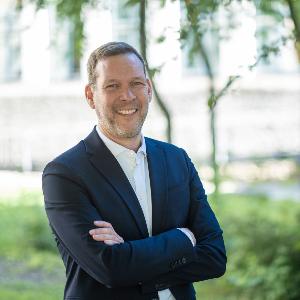Economic geographies of the future: How do new things come about?
7 Jan 2025
New LMU appointment Johannes Glückler investigates the networks, institutions, and governance of innovation in its spatial context.
7 Jan 2025
New LMU appointment Johannes Glückler investigates the networks, institutions, and governance of innovation in its spatial context.

Johannes Glückler is Professor of Economic Geographies of the Future | © LMU/LC Productions
How do innovations come about? Why do some succeed and others fail? And above all, where? In a study of cryptocurrencies, the latest article from the chair of Prof. Johannes Glückler reveals how multifaceted controversies are generated by groundbreaking innovations. It illuminates how social networks and institutions determine the success or failure of these innovations in specific geographical contexts. One of the main focuses of Glückler’s research is on precisely this tension between the social necessity for transformation – for example, in the direction of inclusive prosperity and sustainability – and the controversies engendered by corresponding innovations.
Glückler has been Chair Professor of Economic Geographies of the Future at LMU’s Department of Geography since September 2023. At the chair, he researches the geographies of innovation and of socioeconomic change. Glückler has played a major role in shaping the approach of relational economic geography. “Relational means viewing economic processes and their consequences as determined by the interactions and relationships between actors, and to do so in specific institutional and geographical contexts,” explains Glückler.
Glückler’s research is based around networks, institutions, and governance. Social network research makes it possible to analyze the structures of relationships between actors and their effects on economic change. Institutions shape stable patterns of social exchange and underlying norms, and their transformation influences the spreading or blocking of innovations. And governance research deals with how actors coordinate to achieve common goals while considering the geographical and cultural diversity of the parties involved.
Employing these approaches, Glückler researches topics such as the effects of digitalization, new technologies, and sustainability goals on wealth creation and its spatial organization – including in the bioeconomy, the creative economy, and the raw material economy. Current projects analyze subjects such as the transition from petroleum- to bio-based textiles; the harmonization of national legal cultures in the course of the establishment of the EU’s Unified Patent Court; the role of spatial peripheries in controversial innovations; and the role of the state and public procurement in promoting the sustainable and inclusive development of regions.
Glückler studied geography, sociology, and psychology at the University of Würzburg, the London School of Economics, and the University of Salamanca. In 2004, he completed his doctorate at the University of Frankfurt. His first professorship was at the Catholic University of Eichstätt, before holding the Chair of Economic and Social Geography at Heidelberg University from 2008 to 2023.
In addition to basic research, Glückler engages in applied research in collaboration with companies. He also supports ministries and professional and trade associations with studies and advice on topics relating to regional development and governance, innovation networks, and the effects of education and culture on regional economies. For example, he carried out numerous studies that calculated the regional economic effects of the universities in North Rhine-Westphalia, Thuringia, and Baden-Wuerttemberg. A study he has just completed shows: “The universities in Baden-Wuerttemberg generate gross value added of almost eight billion euros out of the nearly three billion euros they receive in state funding. Such returns are scarcely obtainable with other uses of public money.”
For me as an economic geographer, Munich is ideal. It offers excellent conditions for researching the development possibilities of companies and regions in a spatial contextJohannes Glückler , Professor of Economic Geographies of the Future
The Munich Metropolitan Region is a particularly attractive research location for the Professor of Economic Geographies. An important engine of the European economy, its competitiveness and future viability are founded on a wide range of economic activity, from engineering and the auto industry to the high-tech sector, the media, and financial services. “For me as an economic geographer, Munich is ideal. It offers excellent conditions for researching the development possibilities of companies and regions in a spatial context,” he explains.
Through his research at LMU, Glückler also advances international cooperation. Among other initiatives, he is currently founding, as part of his research in Latin America, the GIST Hub, a project to establish a strategic partnership between LMU and UC Chile University. Funded by the German Federal Ministry of Education and Research, the GIST Hub will pursue joint research. In addition, it will establish a further training program for decision-makers in the area of inclusive governance and innovation solutions for the sustainability transition in the energy and raw material sectors.
Back in 2012, Glückler had already co-founded the Governance of Risk and Resources master’s program in a collaboration between Heidelberg University and UC Chile.“I’m delighted to be at LMU, where I can combine my experience with the opportunities afforded by this University of Excellence,” says Johannes Glückler. The name of his chair – Economic Geographies of the Future – reflects his vision: “It’s a call to fix our curiosity and our knowledge in a forward direction.”